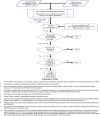Doctors Who Perform Abortions: Their Characteristics and Patterns of Holding and Using Hospital Privileges
- PMID: 31020009
- PMCID: PMC6466461
- DOI: 10.1177/2333392819841211
Doctors Who Perform Abortions: Their Characteristics and Patterns of Holding and Using Hospital Privileges
Retraction in
-
Retraction Notice.Health Serv Res Manag Epidemiol. 2024 Feb 5;11:23333928231216699. doi: 10.1177/23333928231216699. eCollection 2024 Jan-Dec. Health Serv Res Manag Epidemiol. 2024. PMID: 38328416 Free PMC article.
Abstract
Controversy exists regarding whether doctors who perform abortions should be required to hold hospital admitting privileges, but no research exists as to the extent to which they actually hold and use such privileges. Extensive Internet and government data sources were used to identify and verify abortionists in Florida. All medical and osteopathic abortion doctors who were licensed to practice at any time during the period 2011 to 2016 were included in the study (n = 85). Every abortionist hospital admission of a female patient aged 15 to 44 occurring during the 6-year study period was identified (n = 21 502). Abortionist physicians are 74.1% male, 62% have been in practice for 30 years or longer, 27.1% are graduates of foreign medical schools, and 55.3% are board certified. Nearly half (48.2%) of the abortionists had at least 1 malpractice claim, public complaint, disciplinary action, or criminal charge. Half (50.6%) of the abortionists reported hospital privileges, but only 32 (37.6%) admitted at least 1 patient to a hospital. Seven physicians accounted for 68.2% of all the admissions, and 79.6% of all admissions were related to a live birth. Black was the modal race (47.6%) and Medicaid the most frequent (64.9%) pay source. Nearly one-fifth (19.4%) of admissions came through the emergency department. Physicians who hold hospital privileges are significantly (P < .05) more likely to be board certified and to be approved for Medicaid payment than their colleagues without privileges. Of those doctors who hold and use hospital privileges, the lowest admission volume physicians are significantly less likely to be involved in live births, more likely to admit commercially insured and white inpatients, and much more likely to use the emergency room as the route to hospital admissions for their Medicaid-eligible and black patients. Further study of abortionist physicians is indicated regarding their heterogeneous personal and professional characteristics; their career pathways and practice concentrations; their relative integration with or isolation from peers and the professional network; the importance of black and poor induced abortion patients in their total caseload; and, especially for abortionists without hospital privileges, the means by which their patients requiring emergency care and hospitalization are accommodated.
Keywords: abortionist physicians; emergency room admissions; emergency visits; hospital privileges; racial disparities.
Conflict of interest statement
Declaration of Conflicting Interests: The author(s) declared no potential conflicts of interest with respect to the research, authorship, and/or publication of this article.
Figures
References
-
- Carr G. Appeals court upholds Louisiana law requiring doctors at abortion facilities to have admitting privileges with nearby hospitals. The Daily Caller. 2018. https://dailycaller.com/2018/09/27/louisiana-abortion-nearby-hospital/. Accessed January 21, 2019.
-
- American Public Health Association. APHA Policy Statement 20151: opposition to requirements for admitting privileges and transfer agreements for abortion providers. 2015. https://www.apha.org/policies-and-advocacy/public-health-policy-statemen.... Accessed January 21, 2019.
-
- Schaible B. Improving the accuracy of maternal mortality and pregnancy related death. Issues Law Med. 2014;29(2):231–242. - PubMed
-
- Gissler M, Kaupilla R, Merilainen J, Toukomaa H, Hemminki E. Pregnancy-associated deaths in Finland, 1987–1994—definition problems and benefits of record linkage. Acta Obstet Gynecol Scand. 1997;76(7):651–657. - PubMed
Publication types
LinkOut - more resources
Full Text Sources



